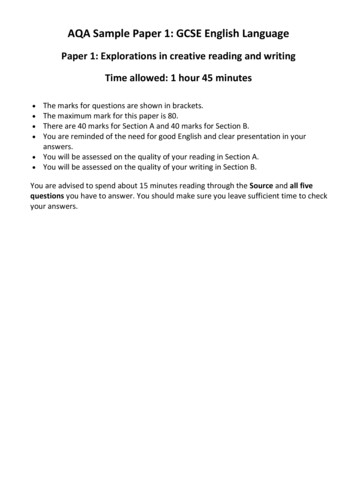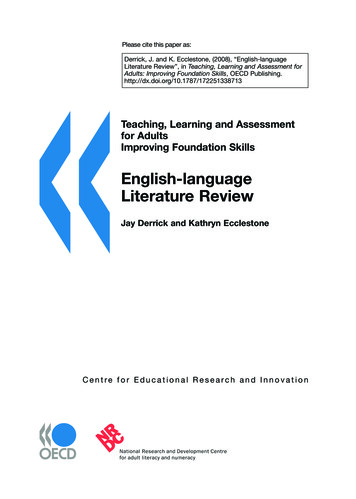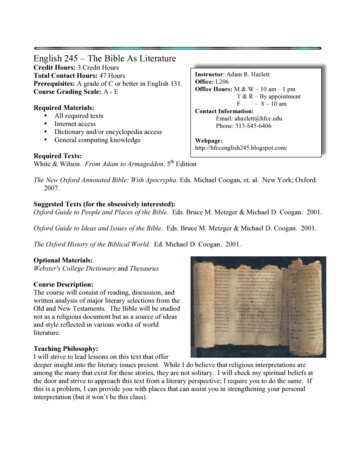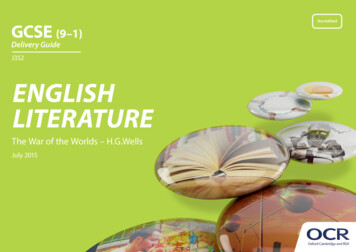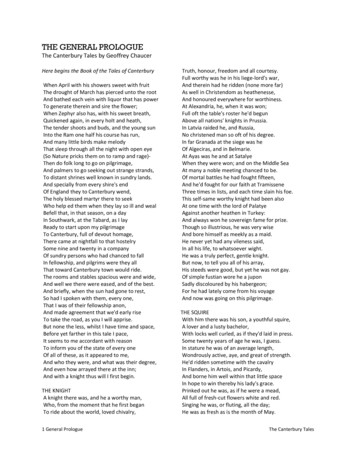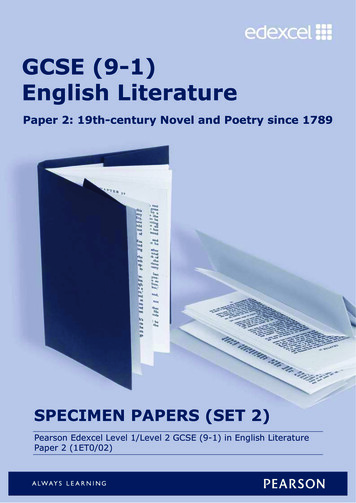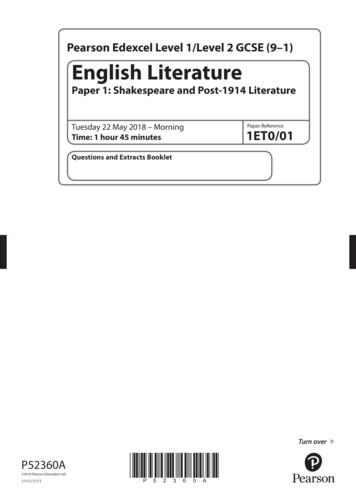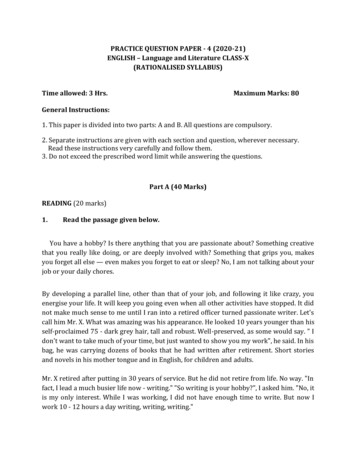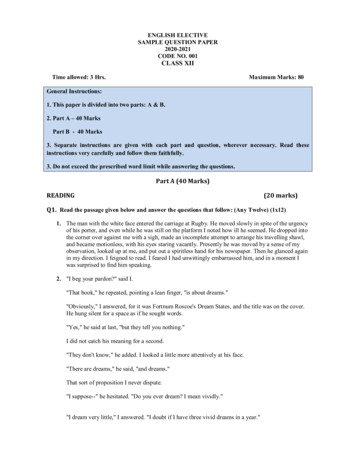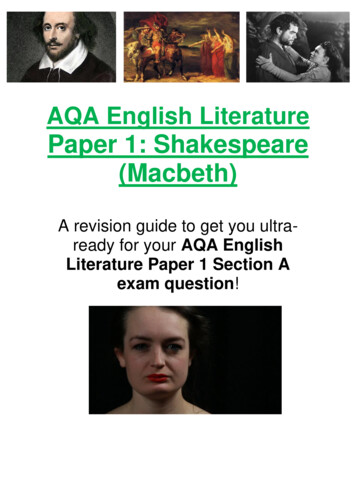
Transcription
AQA English LiteraturePaper 1: Shakespeare(Macbeth)A revision guide to get you ultraready for your AQA EnglishLiterature Paper 1 Section Aexam question!
AQA English Literature Paper 1:ShakespeareIn your first question you will be providedwith a short extract from Macbeth (it couldbe from anywhere in the play).Your question will ask you to discuss aparticular theme or character shown in theextract and the rest of the play.This means for your revision you need to:1)2)3)4)Know the plot of the play very wellKnow the characters very wellKnow key quotes for all the main characters and themesBe able to analyse quotes for language and to consider thestructure of the play5) Understand the context of the play – including when it was writtenand when it was set.Here’s an example AQA exam question for Section A:Section A:ShakespeareAnswer one question from this section on your chosen textMacbethRead the following extract from Act 1 Scene 5 of Macbeth and thenanswer the question that follows.At this point in the play Lady Macbeth is speaking.She has just received the news that King Duncan will be spending thenight at her castle.The raven himself is hoarseThat croaks the fatal entrance of DuncanUnder my battlements. Come, you spiritsThat tend on mortal thoughts, unsex me here,And fill me from the crown to the toe topfullOf direst cruelty; make thick my blood,Stop up th’access and passage to remorseThat no compunctious visitings of natureShake my fell purpose nor keep peace betweenTh’effect and it. Come to my woman's breasts,And take my milk for gall, you murd’ring ministers,Wherever in your sightless substancesYou wait on nature's mischief. Come, thick night,And pall thee in the dunnest smoke of hell,That my keen knife see not the wound it makesNor heaven peep through the blanket of the dark,To cry ‘Hold, hold!
Starting with this speech, explain how far you think Shakespearepresents Lady Macbeth as a powerful woman.Write about: how Shakespeare presents Lady Macbeth in this speech how Shakespeare presents Lady Macbeth in the play as a whole.[30 marks]AO4 [ 4 marks]Revision Activity 1: Making Notes on the QuestionLady Macbeth speaks to evil spiritsand asks them to ‘unsex me here’.She wants to be able to carry out themurder without feeling anythingabout it. This shows she is capable ofgreat evil and is therefore verypowerful.Lady Macbeth as a powerfulwomanChallenge: Create a detailed mind map of all the ways Shakespearepresents Lady Macbeth as a powerful woman in the play.Extra Challenge: Add quotes to each of your ideas to support yourinterpretations.Mega Challenge: Evaluate how Lady Macbeth’s power changesthroughout the play. Write an analysis of this in your exercise book.
Revision Activity 2: Analysing The Mark SchemeLook at the AOs above.Challenge: Highlight all the important words in the AOs. Write down fivethings you will need to include in your Macbeth answer to make sure youget a good mark.Extra Challenge: In your own words, write down exactly what skills andknowledge the examiners are looking for in your Macbeth answer.Mega Challenge: How would you plan your essay to ensure you meetALL these AOs?
Revision Activity 3: PETAZL paragraphsLook back at the exam question included at the start of the booklet.Shakespeare shows Lady Macbeth as a powerful woman in this extract byillustrating her control over her language. When she says: “The raven himself ishoarse / That croaks the fatal entrance of Duncan / Under my battlements” LadyMacbeth uses metaphors to emphasise how determined she is to kill Duncan andtake power for herself. The raven, a symbol of death in Jacobean England, is shownhere to be personified and has a ‘hoarse’ voice because it has been announcingDuncan’s death so much. Moreover, the use of ‘battlements’ to describe LadyMacbeth’s home is military imagery to show to the audience that Lady Macbeth isintending to create conflict and ultimately kill the king so that she can take power.Her use of language here shows she is determined to carry out her plan and showshow much power she has over what she says to the audience.P PointE Evidence (Quote)T TechniqueA AnalysisZ ZoomL LinkUsing this example PETAZL paragraph:Challenge: Write out ONE PETAZL paragraph about theextract.Extra Challenge: Write out TWO PETAZL paragraphs – oneabout the extract and one about the rest of the play.Mega Challenge: Begin writing out your full answer to thisquestion.
Key ThemesAmbitionKey pointMacbeth wants to be kingso badly that he talks ofmurder early on in theplay.Relevant quote“My thought, whosemurder yet is butfantastical”Finished? Complete tables for the following themes:Fate/Free WillViolenceNature and the unnatural/supernaturalManhoodGenderTimeExplanation of quoteThe witches did notmention the idea ofmurder – this issomething Macbeth putinto his own head. Thisshows that deep down heis desperate to becomeking and will do anythingto achieve it.
Key QuotesThe Witches"Fair is foul, and foul is fair." (Act I, Scene I)"When the battle's lost and won." (Act I, Scene I)"When shall we three meet again in thunder, lightning, or in rain? When thehurlyburly 's done, When the battle 's lost and won." (Act I, Scene I)"By the pricking of my thumbs, Something wicked this way comes." (Act IV, Scene I)"Double, double toil and trouble; Fire burn, and cauldron bubble." (Act IV, Scene I)Macbeth"If chance will have me king, why, chance may crown me." (Act I, Scene III)"I dare do all that may become a man; Who dares do more is none." (Act I, SceneVII)"I have no spur to prick the sides of my intent, but only vaulting ambition, whicho'erleaps itself, and falls on the other." (Act I, Scene VII)"Is this a dagger which I see before me, The handle toward my hand?" (Act II, SceneI)"Will all great Neptune's ocean wash this blood clean from my hand? No, this myhand will rather the multitudinous seas incarnadine, making the green one red" (ActII, Scene II)Macbeth:[Looking on his hands] This is a sorry sight.Lady Macbeth:A foolish thought, to say a sorry sight.Macbeth:There's one did laugh in 's sleep, and one cried,"Murther!"That they did wake each other. I stood and heardthem;But they did say their prayers, and address'd themAgain to sleep.(Act II, Scene II)"There's daggers in men's smiles." (Act II, Scene III)"What's done is done." (Act III, Scene II)"Out, out, brief candle! Life's but a walking shadow, a poor player that struts and fretshis hour upon the stage and then is heard no more: it is a tale told by an idiot, full ofsound and fury, signifying nothing." (Act V, Scene V)
"I bear a charmed life." (Act V, Scene VIII)MalcolmAbout the old Thane of Cawdor: "Nothing in his life became him like the leaving it; hedied as one that had been studied in his death to throw away the dearest thing heowed, as 't were a careless trifle." (Act I, Scene IV)Lady MacbethLady Macbeth:The raven himself is hoarseThat croaks the fatal entrance of DuncanUnder my battlements. Come, you spiritsThat tend on mortal thoughts, unsex me here,And fill me from the crown to the toe topfulOf direst cruelty!(Act I, Scene V)"Yet do I fear thy nature; It is too full o' the milk of human kindness." (Act I, Scene V)"Look like the innocent flower, but be the serpent under't." (Act I, Scene V)"Screw your courage to the sticking-place." (Act I, Scene VII)Lady Macbeth:Why did you bring these daggers from the place?They must lie there. Go carry them, and smearThe sleepy grooms with blood.Macbeth:I'll go no more.I am afraid to think what I have done;Look on't again I dare not.Lady Macbeth:Infirm of purpose!Give me the daggers. The sleeping and the deadAre but as pictures; 'tis the eye of childhoodThat fears a painted devil.(Act II, Scene II)Lady Macbeth:How now, my lord, why do you keep alone,Of sorriest fancies your companions making,Using those thoughts which should indeed have diedWith them they think on? Things without all remedyShould be without regard: what's done, is done.(Act III, Scene II)"Out, damned spot! out, I say!" (Act V, Scene I).
"All the perfumes of Arabia will not sweeten this little hand." (Act V, Scene I)Revision Activity 5: Key QuotesCan you think of any other key quotes? Add them to your notes here. Explain whythey are important in terms of the whole play, its themes and characters:
Understanding context (AO3)William Shakespeare wrote Macbeth in 1606 and it was performed at a time of politicaltension. The current monarch was James I, who inherited the throne of England after QueenElizabeth I died. With Elizabethan having no children, her distant cousin James was the nextbest claimant to the crown.Many other members of the aristocracy felt they too had a good claim to the throne, whichmeant James’ place as king was not always certain.King James was a protestant – one of the reasons he was able to gain the crown – despitehis mother being a catholic. Catholics in England had hoped that James might support thembecause of his family connections, but he did not. This led to a number of conspiracies andplots being developed against him, including the infamous Gunpowder Plot of 1605, just ayear before Shakespeare wrote Macbeth.Generally, many of the plays Shakespeare wrote during the Elizabethan era were verypositive such as A Midsummer Night’s Dream, but when James came to the throne hebrought with him political uncertainty, and this atmosphere is reflected in the more menacingand darker plays Shakespeare wrote like Macbeth and Hamlet.King James I was Scottish by birth and fascinated by his own family history. The play‘Macbeth’ is based on real events from Scottish history and there was actually a KingMacbeth in Scotland. In real life, King Macbeth reigned from 1040 to 1057 and had manysuccesses as a king, whilst Duncan was actually a weak man who lacked respect from thepeople of Scotland.Shakespeare based many of his plays on ‘The Chronicles of Holinshed’. In this book,Banquo is included but he is shown to be a traitor just like Macbeth and assists him in themurder.
King James believed himself to be a descendant of Banquo’s (although we now know hewasn’t), which may have affected the way Shakespeare showed Banquo on stage.Moreover, the Jacobeans believed in the idea of a ‘Great Chain of Being’ The idea of thiswas that God had created a hierarchy that everyone had to live by, which God at the top andthe King or Queen one place below Him. Therefore no one should want to become kingbecause it was a position chosen by God and no one else could choose it. To want tobecome the monarch was therefore viewed as a sin and going against God.King James very much believed in the concept of ‘divine right’ to rule. When a king or queenis coronated, the ceremony makes them ‘divine’, in many ways like the Catholic Church’sPope who is also seen to be divinely chosen and the ‘mouthpiece of God’ on earth.During the Elizabethan era, Shakespeare’s acting company was called the ‘Chamberlain’sMen’, but during King James’ time they changed their name to the ‘King’s Men’. In manyways, the play ‘Macbeth’ flatters and pleases King James. Think about what happens tosomeone like Macbeth who goes against ‘divine rule’. Do you remember the line of kingsthat stretches out ‘to the crack of doom’? If James believed himself to be a descendant ofBanquo then this implies many of his children would be king as well.King James was very interested in the concept of an ‘ideal king’ and wrote about it in a bookcalled ‘Basilikon Doron’. In this he discussed how a king should be someone of absoluteintegrity and someone who does their duty to both their country and God. In the play,Malcolm seems to represent this ideal king, something King James would have beenfascinated by.Furthermore, King James was intrigued by the supernatural, such as witches and ghosts,and wrote a book called ‘Daemonologie’ about this. That the play is so packed full of thesupernatural is again possibly to interest the king. It is believed that King James himself wasinvolved in some witch trials up in North Berwick (near Scotland).So why did Shakespeare write a Scottish-based play warning about the dangers of being tooambitious and the dangers that await those that try to kill the king to gain power for
themselves? This contextual information might be very useful to mention in your examessay.Revision Activity 6: Historical ContextChallenge: Read through the historical context information and highlightall the key parts that will be helpful for your revision.Extra Challenge: Annotate the information above, making notes on howthis helps us to understand the play better. Add in parts of the play thatwould be helpful to talk about in your exam answer.Mega Challenge: Go back and add some of this information to yourexam-style answer.
Notes pages:
(Act I, Scene V) "Look like the innocent flower, but be the serpent under't." (Act I, Scene V) "Screw your courage to the sticking-place." (Act I, Scene VII) Lady Macbeth: Why did you bring these daggers from the place? They must lie there. Go carry them, and smea
